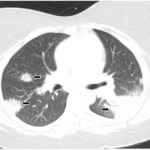“And?” I asked.
“It didn’t work.”
‘If you have a patient with an unusual prodrome you’ve never seen prior to the ultimate development of rheumatoid arthritis, you probably haven’t seen enough rheumatoid arthritis.’
Physical Exam
As she talked, I inspected her hands. She flinched slightly when I palpated several equivocally swollen knuckles on the left hand. The lungs were clear, but a faint murmur was present on her cardiac exam: Early systolic, left sternal border. Grade 2/6, the kind of innocent murmur most elderly patients develop as the aortic valve stiffens with age.
“Can you lie down?” I asked.
The shoulders and hips demonstrated pain-free normal motion. Her abdomen was non-tender. The liver and spleen were not enlarged. There was no lymph node enlargement or subtle rash. Although there was no muscle weakness, there was low-grade tenderness in the forearms. “In what way are you worse?” I asked.
“Lately, I’m sweating at night. Not every night.” She ran a finger down the page: “April 12, 18 and 21. Then, last night I was a big wet ball of sweat. And fevers? I’ve kept a graph.”
She handed me a meticulously diagrammed chart where she had recorded her temperature three and, sometimes four, times daily. For the most part, the temperatures were in the normal range throughout the day, but each evening temperatures rose to just over 100ºF.
Suddenly, the dynamics of the visit changed; night sweats and fevers five weeks into an illness are worrisome. I stuck my head out the exam door and asked Joanne to let the other patients know that I was running late. I wondered if I still had some salted nuts in my drawer.
Finishing the exam, except for the scattered swelling in several of the knuckles and low-grade tenderness in her forearms and calves, there were no clues to point toward a definitive diagnosis. I straightened up and told Mrs. N that although her symptoms might represent a persistent viral infection, we needed to look at further laboratory studies. “I know your chest X-ray was normal, but with the night sweats …”
“Larry thought you might want to get a CT scan of the chest,” she finished my sentence.
“Right. So let’s get you scheduled for that,” I replied without skipping a beat. Though Dr. N was not in the room, he seemed to be present in our deliberations. “I’m adding some immunologic labs. We’ll need a urine sample. And can I write a prescription for a long-acting anti-inflammatory? Once-daily meloxicam may help quiet down the muscle aching and joint pain.”


